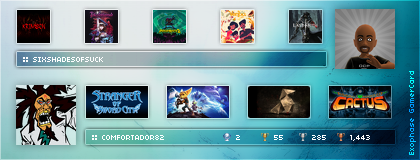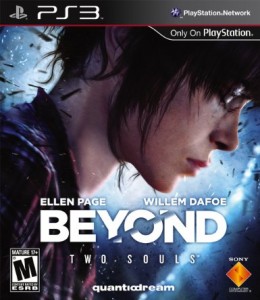 BUY IT FROM AMAZON: RIGHT HERE!
BUY IT FROM AMAZON: RIGHT HERE!
PLATFORM: PS3
PRICE: $59.99
ESRB RATING: M
DEVELOPER: Quantic Dream
PUBLISHER: Sony Computer Entertainment
It’s pretty apt that a game called Beyond Two Souls has a major, frustrating identity crisis, but that’s what happens when you start bringing film and video games this close to the artistic DMZ, which just so happens to be David Cage’s MO. The frustrating part isn’t his insistence that the two mediums could get a lot cozier than they are now, because they can be, and Beyond does a bang up job convincing that yes, the experiment should continue. The frustrating part is watching Cage be so obviously onto something, and stumble on his follow-through.
 Beyond is roughly 20 years in the life of Jodie Holmes (Ellen Page), from introverted 8 year old to slightly less introverted 20-something. Since birth, Jodie has been tethered to a paranormal entity named Aidan. Aidan has a fair amount of control over the world, being able to exert force on objects, even possess people with enough effort. It also gives Jodie the ability to see dead folks and how the dead folks got dead, which you might imagine doesn’t exactly make for the happiest childhood or adulthood. Still, Jodie grows up semi-well-adjusted all things considered, mostly thanks to some decent fathering by Professor Nathan Dawkins (Willem Dafoe) and Cole Freeman (Kadeem Hardison), two scientists in charge of a military project to investigate the paranormal. But of course, with the military involved, everything goes to shit a bunch of times down the line, leaving Jodie on the run, and the potential for the other world to do some serious damage in ours.
Beyond is roughly 20 years in the life of Jodie Holmes (Ellen Page), from introverted 8 year old to slightly less introverted 20-something. Since birth, Jodie has been tethered to a paranormal entity named Aidan. Aidan has a fair amount of control over the world, being able to exert force on objects, even possess people with enough effort. It also gives Jodie the ability to see dead folks and how the dead folks got dead, which you might imagine doesn’t exactly make for the happiest childhood or adulthood. Still, Jodie grows up semi-well-adjusted all things considered, mostly thanks to some decent fathering by Professor Nathan Dawkins (Willem Dafoe) and Cole Freeman (Kadeem Hardison), two scientists in charge of a military project to investigate the paranormal. But of course, with the military involved, everything goes to shit a bunch of times down the line, leaving Jodie on the run, and the potential for the other world to do some serious damage in ours.
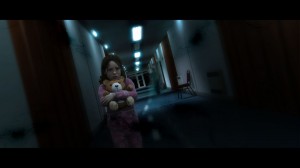 I’ve had to explain the plot of Beyond a couple dozen times now since I’ve started playing it to a lot of folks, gamers and non-gamers alike, interested in “That Ellen Page game” more than anything else, and it takes some genuine effort to not whinge through it. Add a shark, and you’d be watching this on Syfy by the end of the month. With that as a basis, though, it makes it a lot easier to see what Cage is bringing to the table, and that amount is considerable though, as mentioned, unpolished. This *could*, theoretically, have been a SyFy Channel movie that’s just a glorified, playable Carrie sequel focused on Jodie’s adult life, on the run from the government, with the power of a ghost on her side. That story’s still in here, in fact, and it’s rather spectacular when the game gets down to its actiony business. There’s an extended sequence that starts with sheriffs boarding her train that ends with an entire small town burning to the foundation that I’d put up against most of the action scenes this year for construction and tension, and the fact that I was in control of it all made it more exhilarating. Mission already accomplished, interactive drama. Where Cage is going with all this, however, hinges on knowing the rest of her life. It hinges on the kind of character development before the “plot” kicks in to happen to make where Jodie finds herself in that prologue work. It hinges on actually liking Jodie as a character, and the game does rather strong work giving me reasons *to* like her, and want her to live her life unhindered.
I’ve had to explain the plot of Beyond a couple dozen times now since I’ve started playing it to a lot of folks, gamers and non-gamers alike, interested in “That Ellen Page game” more than anything else, and it takes some genuine effort to not whinge through it. Add a shark, and you’d be watching this on Syfy by the end of the month. With that as a basis, though, it makes it a lot easier to see what Cage is bringing to the table, and that amount is considerable though, as mentioned, unpolished. This *could*, theoretically, have been a SyFy Channel movie that’s just a glorified, playable Carrie sequel focused on Jodie’s adult life, on the run from the government, with the power of a ghost on her side. That story’s still in here, in fact, and it’s rather spectacular when the game gets down to its actiony business. There’s an extended sequence that starts with sheriffs boarding her train that ends with an entire small town burning to the foundation that I’d put up against most of the action scenes this year for construction and tension, and the fact that I was in control of it all made it more exhilarating. Mission already accomplished, interactive drama. Where Cage is going with all this, however, hinges on knowing the rest of her life. It hinges on the kind of character development before the “plot” kicks in to happen to make where Jodie finds herself in that prologue work. It hinges on actually liking Jodie as a character, and the game does rather strong work giving me reasons *to* like her, and want her to live her life unhindered.
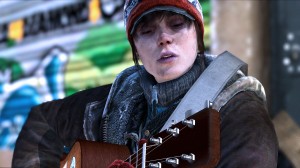 Page is doing the brunt of the heavy lifting here. No one should be surprised by now that Page is neverendingly reliable as an actress, and while any A-game performance in this medium is going to stand out from the crowd, even counted among her film work, this is a strong performance requiring her to inhabit a 20-year character arc over the course of 10 hours, a character arc full of some truly harsh, heartbreaking, and lonely times, and it’s a pretty big bright spot on an already sterling filmography. She’s a standout, but she’s also, thankfully, not alone. Dafoe, of course, is Dafoe, though there’s a warmth here we don’t normally get from the guy that makes this something even more special, beyond even the medium. Cage’s characters actually do feel like well-rounded, empathetic human beings this time around for the most part, and their reactions don’t feel like they’re coming from the Wiseau School of Performance Art. Everyone is raising that SyFy script several stories above its pedigree through sheer force of will. There’s actually the faint glimmer of a director’s vision here, too, and not just the kind of vision Suda 51 has, where it’s a trademark set of quirks and insane fluorishes that one can only blame on psilocybin or a Daddy-Took-Me-To-An-Eyes–Wide–Shut-Party-When-I-Was-6 wrong kind of childhood. In the years since Heavy Rain, Cage has a much better grasp on how to use his frame, stillness, the chemistry of a conversation, and POV to his advantage. Until some major fumbles to get to the endgame, Cage is smart enough to let the story and characters breathe, gain depth, and do so while still trusting the audience to pick up some of the slack in reading between the lines when these people interact, and the player interacts, on their behalf.
Page is doing the brunt of the heavy lifting here. No one should be surprised by now that Page is neverendingly reliable as an actress, and while any A-game performance in this medium is going to stand out from the crowd, even counted among her film work, this is a strong performance requiring her to inhabit a 20-year character arc over the course of 10 hours, a character arc full of some truly harsh, heartbreaking, and lonely times, and it’s a pretty big bright spot on an already sterling filmography. She’s a standout, but she’s also, thankfully, not alone. Dafoe, of course, is Dafoe, though there’s a warmth here we don’t normally get from the guy that makes this something even more special, beyond even the medium. Cage’s characters actually do feel like well-rounded, empathetic human beings this time around for the most part, and their reactions don’t feel like they’re coming from the Wiseau School of Performance Art. Everyone is raising that SyFy script several stories above its pedigree through sheer force of will. There’s actually the faint glimmer of a director’s vision here, too, and not just the kind of vision Suda 51 has, where it’s a trademark set of quirks and insane fluorishes that one can only blame on psilocybin or a Daddy-Took-Me-To-An-Eyes–Wide–Shut-Party-When-I-Was-6 wrong kind of childhood. In the years since Heavy Rain, Cage has a much better grasp on how to use his frame, stillness, the chemistry of a conversation, and POV to his advantage. Until some major fumbles to get to the endgame, Cage is smart enough to let the story and characters breathe, gain depth, and do so while still trusting the audience to pick up some of the slack in reading between the lines when these people interact, and the player interacts, on their behalf.
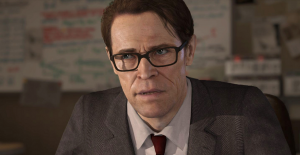 There is, of course, the issue of the game being, well, a game, which is where Cage’s biggest problems and biggest strengths stem. Heavy Rain‘s QTE/choice system returns, swapping the Norman Jayden mystery stuff for a rather elegant, Zack Snydery speed ramping system that allows the player a second or two to react to hectic action, and screwing up has painful consequences, though nothing in the game is necessarily impossible. Having said that, a lot of your non-expositional actions in Heavy Rain felt like busywork for the sake of being busywork, especially a lot of the Ethan Mars stuff concerning his depressed kid. There’s a few moments of that here. There’s a segment with Jodie at a Navajo ranch specifically, which tries that Red Dead Redemption thing of mundane housework as respite, but it’s too clunky to not be a chore. The game also has its moments where you start to see the game’s rails guiding you along, keeping Aidan from possessing some folks but not others, or not choking the life out of everybody in a room to get by, or Jodie turning back from a true invisible wall to get back on task. A ghostly rampage early on at a party gone wrong, while still satisfying, still feels constricted by nature of not being able to Vader around, and psychically crack some teenage necks, not because that’s something we need–I got plenty of joy getting Aidan to toss a kitchen knife at a kid’s chest–but because the game sets up that that’s something Aidan can do.
There is, of course, the issue of the game being, well, a game, which is where Cage’s biggest problems and biggest strengths stem. Heavy Rain‘s QTE/choice system returns, swapping the Norman Jayden mystery stuff for a rather elegant, Zack Snydery speed ramping system that allows the player a second or two to react to hectic action, and screwing up has painful consequences, though nothing in the game is necessarily impossible. Having said that, a lot of your non-expositional actions in Heavy Rain felt like busywork for the sake of being busywork, especially a lot of the Ethan Mars stuff concerning his depressed kid. There’s a few moments of that here. There’s a segment with Jodie at a Navajo ranch specifically, which tries that Red Dead Redemption thing of mundane housework as respite, but it’s too clunky to not be a chore. The game also has its moments where you start to see the game’s rails guiding you along, keeping Aidan from possessing some folks but not others, or not choking the life out of everybody in a room to get by, or Jodie turning back from a true invisible wall to get back on task. A ghostly rampage early on at a party gone wrong, while still satisfying, still feels constricted by nature of not being able to Vader around, and psychically crack some teenage necks, not because that’s something we need–I got plenty of joy getting Aidan to toss a kitchen knife at a kid’s chest–but because the game sets up that that’s something Aidan can do.
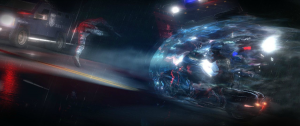 Those moments are, however, scant, while also not going the other direction into all Paranormal Activity demon all the time. Actually, there’s a lot more of Ellen Page: CIA Asshander than one might expect going in, and it’s a small miracle that I believe Page in that part 100%. The non-linear storytelling plays a major part there. The game is broken up into vignettes, long and short, hopscotching around the milestones of Jodie’s life. Cage shows a pretty remarkable amount of control over what we know about Jodie and what we’ve done while inhabiting her shoes at that point in time, and when and what it brings to the experience as opposed to if the plot had played straight through. Structurally, this isn’t much different from what he was doing on Heavy Rain, but needing to tie each event’s new knowledge to the next putting together a story and a theme that only really starts to take shape and reveal when we get to the final decisions, but once reached, it undoubtedly works. The game’s big picture still feels rather slight and plotless taking long stretches piecemeal, and yet in the moment, and taken as an overall whole, it all feels right. The life we’re forced to live as Jodie Holmes is a satisfying one.
Those moments are, however, scant, while also not going the other direction into all Paranormal Activity demon all the time. Actually, there’s a lot more of Ellen Page: CIA Asshander than one might expect going in, and it’s a small miracle that I believe Page in that part 100%. The non-linear storytelling plays a major part there. The game is broken up into vignettes, long and short, hopscotching around the milestones of Jodie’s life. Cage shows a pretty remarkable amount of control over what we know about Jodie and what we’ve done while inhabiting her shoes at that point in time, and when and what it brings to the experience as opposed to if the plot had played straight through. Structurally, this isn’t much different from what he was doing on Heavy Rain, but needing to tie each event’s new knowledge to the next putting together a story and a theme that only really starts to take shape and reveal when we get to the final decisions, but once reached, it undoubtedly works. The game’s big picture still feels rather slight and plotless taking long stretches piecemeal, and yet in the moment, and taken as an overall whole, it all feels right. The life we’re forced to live as Jodie Holmes is a satisfying one.
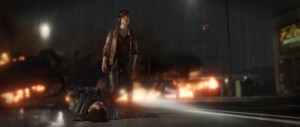 It’s still a really schizophrenic one, though, which is where one foresees a lot of players’/viewers’ disconnect coming from. The same game that spends a subtly effective hour following a homeless, suicidal protagonist trying to find food, shelter, and avoid being ridiculed on video by a gang of assholes spends another hour in a third world country ducking in and out of cover to kill an African despot, another hour walking through a haunted laboratory on fire, killing flying Poltergeist demons, and spends yet another hour helping Ellen Page get ready for a date, while being hindered by a ghost who likes to stack furniture. The game’s schizophrenia isn’t necessarily a hindrance. What it does is create something new, and exciting, but stilted. Holy Motors came to mind about halfway through, a film literally about filmmaking, with the actor’s dreamscape putting him in a position of playing out all these disparate genres, by himself, and each one heading towards a moment of revelation or at least acceptance about the character, but not about the fascinating worlds he’s found himself in. Beyond‘s finale is one giant frayed end, full of story holes and questions and missed character opportunities, and one goofily cool set up for a sequel, and yet, it may not be the point.
It’s still a really schizophrenic one, though, which is where one foresees a lot of players’/viewers’ disconnect coming from. The same game that spends a subtly effective hour following a homeless, suicidal protagonist trying to find food, shelter, and avoid being ridiculed on video by a gang of assholes spends another hour in a third world country ducking in and out of cover to kill an African despot, another hour walking through a haunted laboratory on fire, killing flying Poltergeist demons, and spends yet another hour helping Ellen Page get ready for a date, while being hindered by a ghost who likes to stack furniture. The game’s schizophrenia isn’t necessarily a hindrance. What it does is create something new, and exciting, but stilted. Holy Motors came to mind about halfway through, a film literally about filmmaking, with the actor’s dreamscape putting him in a position of playing out all these disparate genres, by himself, and each one heading towards a moment of revelation or at least acceptance about the character, but not about the fascinating worlds he’s found himself in. Beyond‘s finale is one giant frayed end, full of story holes and questions and missed character opportunities, and one goofily cool set up for a sequel, and yet, it may not be the point.
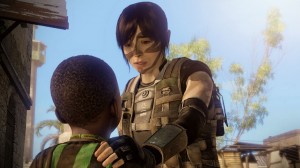 It comes down to this one character, who does indeed have a full, strongly realized arc throughout all this, and one creator, who is still struggling to find his real niche as an auteur, ends up being pretty good at all of them, and failing at cohesion. He’s got the right ethos, the right tools, and Beyond has definitely got the right performers. What he needs, and has needed since Fahrenheit/Indigo Prophecy, is refinement. So, being able to say that Beyond, though still imperfect, is another step forward in that effort to refine this weird new storytelling craft is rather heartening, but it still stops short of the promised land.
It comes down to this one character, who does indeed have a full, strongly realized arc throughout all this, and one creator, who is still struggling to find his real niche as an auteur, ends up being pretty good at all of them, and failing at cohesion. He’s got the right ethos, the right tools, and Beyond has definitely got the right performers. What he needs, and has needed since Fahrenheit/Indigo Prophecy, is refinement. So, being able to say that Beyond, though still imperfect, is another step forward in that effort to refine this weird new storytelling craft is rather heartening, but it still stops short of the promised land.
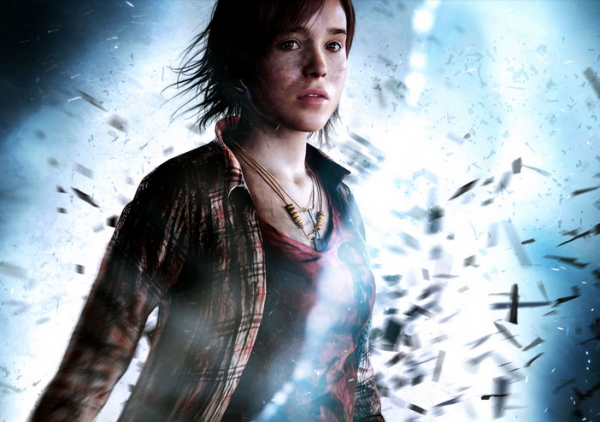
Rating: 




Out of a Possible 5 Stars
